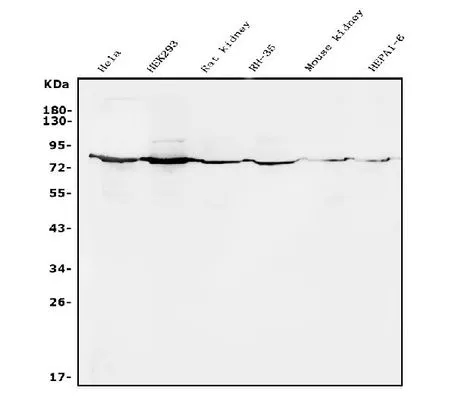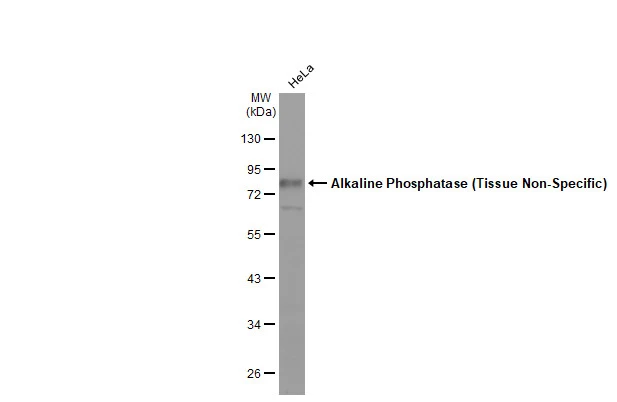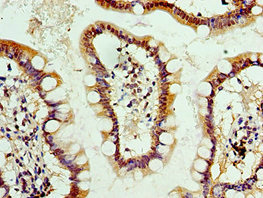![Non-transfected (–) and transfected (+) 293T whole cell extracts (30 μg) were separated by 10% SDS-PAGE, and the membrane was blotted with Alkaline Phosphatase (Tissue Non-Specific) antibody [HL2003] (GTX637904) diluted at 1:1000. The HRP-conjugated anti-rabbit IgG antibody (GTX213110-01) was used to detect the primary antibody. Non-transfected (–) and transfected (+) 293T whole cell extracts (30 μg) were separated by 10% SDS-PAGE, and the membrane was blotted with Alkaline Phosphatase (Tissue Non-Specific) antibody [HL2003] (GTX637904) diluted at 1:1000. The HRP-conjugated anti-rabbit IgG antibody (GTX213110-01) was used to detect the primary antibody.](https://www.genetex.com/upload/website/prouct_img/normal/GTX637904/GTX637904_T-44872_20230303_WB_multiple_B_23030717_526.webp)
Non-transfected (–) and transfected (+) 293T whole cell extracts (30 μg) were separated by 10% SDS-PAGE, and the membrane was blotted with Alkaline Phosphatase (Tissue Non-Specific) antibody [HL2003] (GTX637904) diluted at 1:1000. The HRP-conjugated anti-rabbit IgG antibody (GTX213110-01) was used to detect the primary antibody.
Alkaline Phosphatase (Tissue Non-Specific) antibody [HL2003]
GTX637904
ApplicationsWestern Blot, ImmunoHistoChemistry, ImmunoHistoChemistry Paraffin
Product group Antibodies
ReactivityCanine, Human, Mouse
TargetALPL
Overview
- SupplierGeneTex
- Product NameAlkaline Phosphatase (Tissue Non-Specific) antibody [HL2003]
- Delivery Days Customer9
- Application Supplier NoteWB: 1:500-1:3000. *Optimal dilutions/concentrations should be determined by the researcher.Not tested in other applications.
- ApplicationsWestern Blot, ImmunoHistoChemistry, ImmunoHistoChemistry Paraffin
- CertificationResearch Use Only
- ClonalityMonoclonal
- Clone IDHL2003
- Concentration1 mg/ml
- ConjugateUnconjugated
- Gene ID249
- Target nameALPL
- Target descriptionalkaline phosphatase, biomineralization associated
- Target synonymsAP-TNAP, APTNAP, HOPS, HPPA, HPPC, HPPI, HPPO, TNALP, TNAP, TNS-ALP, TNSALP, alkaline phosphatase, tissue-nonspecific isozyme, alkaline phosphatase liver/bone/kidney isozyme, alkaline phosphatase, liver/bone/kidney, liver/bone/kidney-type alkaline phosphatase, phosphoamidase, phosphocreatine phosphatase, tissue non-specific alkaline phosphatase, tissue-nonspecific ALP
- HostRabbit
- IsotypeIgG
- Protein IDP05186
- Protein NameAlkaline phosphatase, tissue-nonspecific isozyme
- Scientific DescriptionThis gene encodes a member of the alkaline phosphatase family of proteins. There are at least four distinct but related alkaline phosphatases: intestinal, placental, placental-like, and liver/bone/kidney (tissue non-specific). The first three are located together on chromosome 2, while the tissue non-specific form is located on chromosome 1. The product of this gene is a membrane bound glycosylated enzyme that is not expressed in any particular tissue and is, therefore, referred to as the tissue-nonspecific form of the enzyme. Alternative splicing results in multiple transcript variants, at least one of which encodes a preproprotein that is proteolytically processed to generate the mature enzyme. This enzyme may play a role in bone mineralization. Mutations in this gene have been linked to hypophosphatasia, a disorder that is characterized by hypercalcemia and skeletal defects. [provided by RefSeq, Oct 2015]
- ReactivityCanine, Human, Mouse
- Storage Instruction-20°C or -80°C,2°C to 8°C
- UNSPSC12352203

![Whole cell extract (30 μg) was separated by 5% SDS-PAGE, and the membrane was blotted with Alkaline Phosphatase (Tissue Non-Specific) antibody [HL2003] (GTX637904) diluted at 1:1000. The HRP-conjugated anti-rabbit IgG antibody (GTX213110-01) was used to detect the primary antibody. Whole cell extract (30 μg) was separated by 5% SDS-PAGE, and the membrane was blotted with Alkaline Phosphatase (Tissue Non-Specific) antibody [HL2003] (GTX637904) diluted at 1:1000. The HRP-conjugated anti-rabbit IgG antibody (GTX213110-01) was used to detect the primary antibody.](https://www.genetex.com/upload/website/prouct_img/normal/GTX637904/GTX637904_45012_20230505_WB_23050918_741.webp)
![Whole cell extract (30 μg) was separated by 10% SDS-PAGE, and the membrane was blotted with Alkaline Phosphatase (Tissue Non-Specific) antibody [HL2003] (GTX637904) diluted at 1:1000. The HRP-conjugated anti-rabbit IgG antibody (GTX213110-01) was used to detect the primary antibody, and the signal was developed with Trident ECL plus-Enhanced. Whole cell extract (30 μg) was separated by 10% SDS-PAGE, and the membrane was blotted with Alkaline Phosphatase (Tissue Non-Specific) antibody [HL2003] (GTX637904) diluted at 1:1000. The HRP-conjugated anti-rabbit IgG antibody (GTX213110-01) was used to detect the primary antibody, and the signal was developed with Trident ECL plus-Enhanced.](https://www.genetex.com/upload/website/prouct_img/normal/GTX637904/GTX637904_45012_20230616_WB_D_23062019_536.webp)
![Various whole cell extracts (30 μg) were separated by 5% SDS-PAGE, and the membrane was blotted with Alkaline Phosphatase (Tissue Non-Specific) antibody [HL2003] (GTX637904) diluted at 1:500. The HRP-conjugated anti-rabbit IgG antibody (GTX213110-01) was used to detect the primary antibody, and the signal was developed with Trident ECL plus-Enhanced. Various whole cell extracts (30 μg) were separated by 5% SDS-PAGE, and the membrane was blotted with Alkaline Phosphatase (Tissue Non-Specific) antibody [HL2003] (GTX637904) diluted at 1:500. The HRP-conjugated anti-rabbit IgG antibody (GTX213110-01) was used to detect the primary antibody, and the signal was developed with Trident ECL plus-Enhanced.](https://www.genetex.com/upload/website/prouct_img/normal/GTX637904/GTX637904_45012_20230804_WB_23080901_450.webp)
![Alkaline Phosphatase (Tissue Non-Specific) antibody [HL2003] detects Alkaline Phosphatase (Tissue Non-Specific) protein by immunohistochemical analysis. Sample: Paraffin-embedded human kidney. Alkaline Phosphatase (Tissue Non-Specific) stained by Alkaline Phosphatase (Tissue Non-Specific) antibody [HL2003] (GTX637904) diluted at 1:500. Antigen Retrieval: Citrate buffer, pH 6.0, 15 min Alkaline Phosphatase (Tissue Non-Specific) antibody [HL2003] detects Alkaline Phosphatase (Tissue Non-Specific) protein by immunohistochemical analysis. Sample: Paraffin-embedded human kidney. Alkaline Phosphatase (Tissue Non-Specific) stained by Alkaline Phosphatase (Tissue Non-Specific) antibody [HL2003] (GTX637904) diluted at 1:500. Antigen Retrieval: Citrate buffer, pH 6.0, 15 min](https://www.genetex.com/upload/website/prouct_img/normal/GTX637904/GTX637904_45012_20240607_IHC-P_24061301_687.webp)
![Alkaline Phosphatase (Tissue Non-Specific) antibody [HL2003] detects Alkaline Phosphatase (Tissue Non-Specific) protein by immunohistochemical analysis. Sample: Paraffin-embedded mouse kidney. Alkaline Phosphatase (Tissue Non-Specific) stained by Alkaline Phosphatase (Tissue Non-Specific) antibody [HL2003] (GTX637904) diluted at 1:500. Antigen Retrieval: Citrate buffer, pH 6.0, 15 min Alkaline Phosphatase (Tissue Non-Specific) antibody [HL2003] detects Alkaline Phosphatase (Tissue Non-Specific) protein by immunohistochemical analysis. Sample: Paraffin-embedded mouse kidney. Alkaline Phosphatase (Tissue Non-Specific) stained by Alkaline Phosphatase (Tissue Non-Specific) antibody [HL2003] (GTX637904) diluted at 1:500. Antigen Retrieval: Citrate buffer, pH 6.0, 15 min](https://www.genetex.com/upload/website/prouct_img/normal/GTX637904/GTX637904_45012_20240607_IHC-P_M_24061301_196.webp)
![Various whole cell extracts (30 μg) were separated by 5% SDS-PAGE, and the membrane was blotted with Alkaline Phosphatase (Tissue Non-Specific) antibody [HL2003] (GTX637904) diluted at 1:500. The HRP-conjugated anti-rabbit IgG antibody (GTX213110-01) was used to detect the primary antibody. Corresponding RNA expression data for the same cell lines are based on Human Protein Atlas program. Various whole cell extracts (30 μg) were separated by 5% SDS-PAGE, and the membrane was blotted with Alkaline Phosphatase (Tissue Non-Specific) antibody [HL2003] (GTX637904) diluted at 1:500. The HRP-conjugated anti-rabbit IgG antibody (GTX213110-01) was used to detect the primary antibody. Corresponding RNA expression data for the same cell lines are based on Human Protein Atlas program.](https://www.genetex.com/upload/website/prouct_img/normal/GTX637904/GTX637904_45012_20240927_WB_TPM_watermark_24100318_441.webp)


![IHC-P analysis of ovarian cancer tissue using GTX60568 Alkaline Phosphatase (Tissue Non-Specific) antibody [2F4].](https://www.genetex.com/upload/website/prouct_img/normal/GTX60568/GTX60568_20170912_IHC-P_w_23061123_541.webp)




